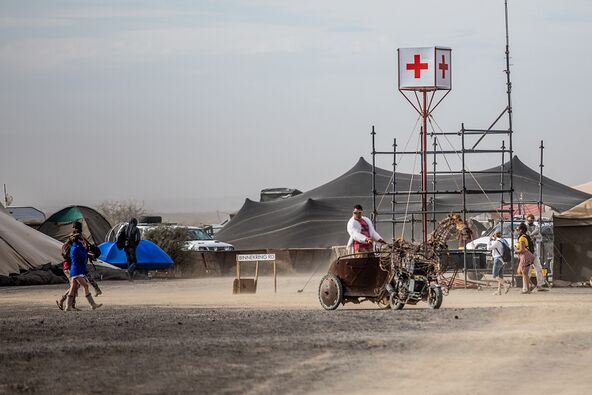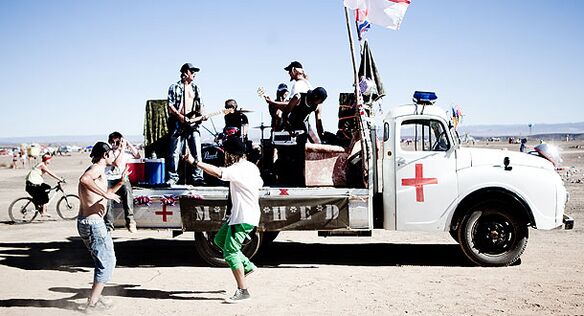MEDICAL INFO

Important information:
- Do not go from hero to zero - stopping your chronic medication is incredibly dangerous and absolutely not recommended. Please stay on your chronic medication and bring all of it with you, so that you have enough to cover your time in the dust. If you have any concerns, contact your doctor and speak to them, we are sure they will give you all the advice you need.
- We have a field hospital staffed with highly skilled specialists and nurses, capable of handling almost everything. We absolutely discourage "camp doctors" from practising on-site as it can end up being somewhat disastrous. If you need any medical assistance, please rather visit the on-site hospital under the Big Red Cross. Please, this is very important; anyone medical who is not part of our crew is not to practice or perform any form of medicine, except for highly specific situations like life-saving methods or accompanying other participants to the field hospital. Gifting your medical services is very kind, but we ask that you rather find something else to give.
- IV bars are banned. End of discussion.
DOCTOR SAYS...
Be responsible for yourself and your medical conditions. Please think about what you need to bring and read the info here to understand what AfrikaBurn’s medics provide and under what circumstances you can access these resources.
There will be medics onsite, but they’re there for emergency situations only, and may turn patients away if the situation is not an emergency…
Remember to bring adequate supplies of any prescription medications. The medics are not a pharmacy and won’t be able to source your meds.
In case of severe emergency the medics can evacuate patients by road or air, but costs associated with evacuation will not be covered by AfrikaBurn.
Note: If you do not have medical aid, you will be asked to cover the costs of your medical evacuation yourself.
If our medical team informs you that you should leave the site for physical or psychological reasons, please listen to them and leave so that you can get the assistance they suggest.
Bring a first aid kit.
Make sure it is stocked up with more plasters and bandages as well as eye drops (for the dust) and citrus soda (UTI’s), and good old disinfectant. More details below.
Experience has taught us that you can't go wrong with other basics such as anti-nausea tabs, anti-diarrhoea tabs, smecta, painkillers, antihistamine, aftersun and that yucky grape flavoured rehydrate stuff. Don't forget that epi-pen if you're allergic enough to warrant one.
MEDIC! OMG, WHERE ARE THE MEDICS?
They’re at Off-Centre Camp, located on the Binnekring - LOOK FOR THE BIG RED CROSS AND MEDIC SIGN.

IN THE EVENT OF A MEDICAL EMERGENCY
- Stay with the person needing assistance.
- Request someone else (anyone else) to go call the medics. Make sure you give instructions to that person of your exact location. Eg: “Tell them that we are about 10m behind Burning Mail Camp on 9-ish!”
- Do not move the person.
- Make sure they are comfortable (put a jersey under their head, etc.) and wait for Medics to arrive.
- Manage their temperature: create shade if it’s hot, and keep them warm if it’s cold.
Don’t panic. Do. Not. Panic!
The following are indicative of what can be treated on site:
- Diarrhoea
- Antiemetic medicine for nausea and vomiting
- Headaches
- Hypoglycemia
- Dehydration
- Hyperthermia
- Hypothermia
- Anaphylactic reactions
- Stings and bites
- Minor asthmatic emergencies
- Minor soft tissue injuries
- Sunburn and other minor burn wounds
- Stabilisation of any fracture
The following (and similar) injuries will be stabilised and referred to the nearest hospital, with the patient to provide their own transport. We recommend having a designated driver in your camp/ group of friends in case of emergency:
- Minor bone fractures
- Stabilised soft tissue injuries
- Broken teeth
- All non-life threatening and stabilised minor events
- Urinary Tract Infections (UTI) - remember to piss regularly, and clear. If you're not, you need to drink more water.
Major injuries such as those listed below will be transported by ambulance or by air (as appropriate) to the nearest major medical facilities at the discretion of the lead medical officer
- Resuscitated patients
- Major bone fractures including longbone, cervical and skeletal
- Asthmatic major
- Severe concussion
- Major laceration, burns and soft tissue injuries
- All unstable life-threatening emergencies may need evacuation by air
THE DESERT IS A DANGEROUS PLACE – SO PACK A FIRST-AID KIT
Your kit should contain the following items:
- plasters in a variety of different sizes and shapes
- small, medium and large sterile gauze dressings
- crêpe rolled bandages
- safety pins
- bandage tape
- disposable sterile gloves
- tweezers and scissors
- alcohol-free cleansing wipes and a bottle of disinfectant
- thermometer
- skin rash cream, such as hydrocortisone or calendula
- cream or spray to relieve insect bites and stings
- antiseptic cream
- painkillers such as paracetamol (or infant paracetamol for children), aspirin (not to be given to children under 16), or ibuprofen
- cough medicine
- antihistamine cream or tablets and epi-pen if prescribed
- distilled water for cleaning wounds
- eye drops, eye wash / eye bath. You also get a kind of nose lube spray that's great for the dry desert.
- anti-puke
- anti-poo if it gets bad
- rehydrate
- aftersun